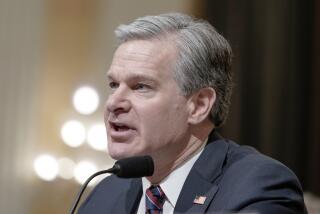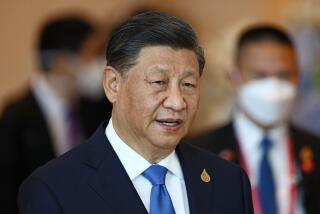World economy tied to U.S. security
- Share via
WASHINGTON — The nation’s new intelligence chief warned Thursday that the global economic crisis is the most serious security peril facing the United States, threatening to topple governments, trigger waves of refugees and undermine the ability of America’s allies to help in Afghanistan and elsewhere.
The economic collapse “already looms as the most serious one in decades, if not in centuries,” said Dennis C. Blair, director of national intelligence, in his first appearance before Congress as the top intelligence official in the Obama administration.
Blair’s focus on the economic meltdown represents a sharp contrast from the testimony of his predecessors in recent years, who devoted most of their attention in the annual threat assessment hearing to the issues of terrorism and the wars in Afghanistan and Iraq.
Blair’s conclusions are likely to bolster President Obama’s case for swift action on a nearly $800-billion stimulus package nearing final approval in Congress.
“Time is probably our greatest threat,” Blair said. “The longer it takes for the recovery to begin, the greater the likelihood of serious damage to U.S. strategic interests.”
He said that one-quarter of the world’s nations had already experienced low-level instability attributed to the economic downturn, including shifts in power. He cited anti-government demonstrations in Europe and Russia, and he warned that much of Latin America and the former Soviet satellite states lacked sufficient cash to cope with the spreading crisis.
“The most likely potential fallout for U.S. interests will involve allies and friends not being able to fully meet their defense and humanitarian obligations,” Blair said. “Potential refugee flows from the Caribbean could also impact homeland security.”
The decline in oil prices in recent months might benefit consumers in the short term and “put the squeeze on the adventurism of producers like Iran and Venezuela,” Blair said, but he warned that prolonged price drops could result in a supply crunch if they lead to cuts or delays in investment in oil development and infrastructure.
Economic crises in recent decades have tended to be confined to specific regions -- such as the Asian financial meltdown of the 1990s -- meaning affected countries could rebuild by focusing on exporting more of their goods.
But “countries will not be able to export their way out of this one because of the global nature” of the crisis, Blair said.
U.S. intelligence analysts fear there could be a backlash against American efforts to promote free markets because the crisis was triggered by the United States.
“We’re generally held to be responsible,” Blair said.
Blair’s written testimony also looks at other security threats. The United States’ most dangerous enemy remains Al Qaeda, he said, but he noted that the terrorist network “is less capable and effective than it was a year ago” because of the toll U.S. missile strikes and other measures have taken on the militants’ sanctuary in Pakistan.
Some of Blair’s most pessimistic language was reserved for Afghanistan, where the security situation has deteriorated substantially because of rampant government corruption and a resurgent Taliban, which carried out fresh attacks in the nation’s capital this week.
As a result, Blair said, the upcoming Afghan presidential election “will present a greater security challenge” than the most recent campaign, in 2004, and he added that “insurgents probably will make a concerted effort to disrupt it.”
Blair’s comments came as the Obama administration is close to a decision on sending tens of thousands of additional troops to Afghanistan.
On Iran, Blair said that the Islamic nation “is clearly developing all the components of a deliverable nuclear weapons program” and that only an internal political decision might prevent the country from crossing the weapons threshold.
Otherwise, he said, “they could have a weapon as early as 2010, but it might take them until 2015.”
--
More to Read
Sign up for Essential California
The most important California stories and recommendations in your inbox every morning.
You may occasionally receive promotional content from the Los Angeles Times.













